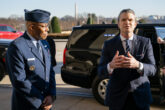December 14, 2017
A Rorschach Test for Civil-Military Relations
Earlier this week, I wrote in Slate about how America’s military leaders have seemingly improvised a new norm of civil-military relations in response to President Donald Trump. The latest proving ground for this norm is the debate over how to treat transgender recruits and servicemembers as the Trump administration battles in the courts to uphold Trump’s order banning such individuals from the service. Under this new norm:
"In response to Trump, the military’s leadership has improvised a new norm of civil-military relations: something in between a yes and a no that doesn’t amount to insubordination but does help modulate Trump’s excesses. ... Call it respectful disobedience or selective engagement or lawful resistance or some other euphemism—but it’s clear that military leaders have found a formula for saluting their commander in chief while keeping his worst excesses at bay."
Assuming for the sake of argument that this observation is true, we might ask whether or not it is a good thing. Although we might praise generals and admirals for upholding certain values against a president we dislike, we might feel very differently if these officers act against values or positions or leaders we do like. The behavior of generals and admirals within our political system serves as a kind of Rorschach test: We see what we want to see, based on our own biases and ideologies.
Recent history offer many case studies for consideration. Less than a generation ago, when today’s generals were mere junior officers, then-Gen. Colin Powell vocally opposed then-President Bill Clinton when he wanted to open the ranks to gay servicemembers. The president and his generals clashed openly on the issue, with Congress ultimately taking the generals’ side but brokering a compromise that allowed gay troops to serve in silence under the “don’t ask, don’t tell, don’t pursue” policy that was carved into statute. This statute was repealed in 2010, in no small measure because the military leadership switched positions on the issue, driven by social change within the ranks and the realities of service and sacrifice by gay troops during America’s longest war. On this issue, military leaders marched neither in step with their political masters nor with public opinion, at least not until the very end.
Read the full commentary in Lawfare.
More from CNAS
-
National Security Has a Human Capital Problem and There’s No Fast Way Out
National security doesn’t really exist without the military forces and supporting civilians to carry it out. Recruitment remains a problem for the armed forces. And there’s a ...
By Katherine L. Kuzminski
-
The Department of Defense’s Breakthrough Nuclear Moment Risks Slipping Away
Unless they act, the Department of Defense’s breakthrough nuclear moment may vanish before it really happens....
By Will Rogers
-
Sharper: National Security Human Capital
U.S. national security depends on the nation’s ability to leverage the expertise of uniformed warfighters and the highly skilled civilian professionals who develop and impleme...
By Charles Horn & Taren Sylvester
-
Hegseth Brings the Culture War to Combat
The fundamental challenge of military leadership lies in creating cohesive teams that can work together in an environment of mortal risk and, when called upon to do so, use le...
By Dr. Jason Dempsey




